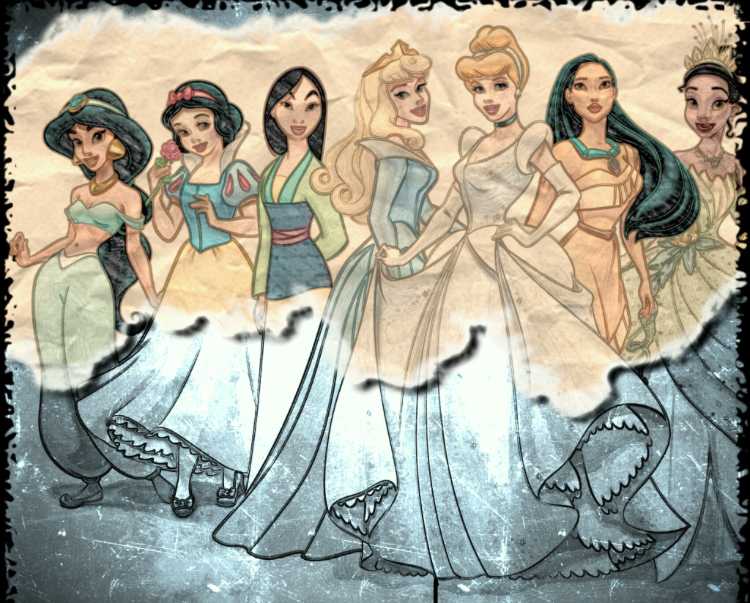Walt Disney himself said that if your only target is children, then your company is doomed, because children grow up. This why his movies all contain lessons for adults, as well as children. Unfortunately, despite this, there are many arguments circulating against the value of Disney’s princess movies. “[insert princess here] just sat around waiting for a man to save her and was motivated solely by her love for him.” These are unfaithful, and in some cases are blatantly incorrect interpretations of the stories these princesses come from and the lifestyles they represent. After all, growing up with princesses on my screen, walls and in my books, I never once thought I was supposed to have a man save me, or let him be my primary reason for doing anything.
Throughout history, women have been taught to compete with each other to be the prettiest, to attract the most handsome and richest men. In modern times with Instagram and YouTube, it’s easier than ever to compare ourselves to others and feel insecure, which can lead to negative outcomes. For example, the villain of “Snow White and the Seven Dwarves” is a vain woman who wants to be the fairest in the land. But her desire to be the prettiest woman in the world ends up being her demise.
Meanwhile, Snow White never once speaks of her own beauty. She just focuses on surviving and comes up with ways to make her friends happy. Her kindness saves her life, bestowing guilt upon the huntsman and rewarding her shelter with the dwarves. This shows us that if we are kind to others and focus on being good people, not worrying about shallow traits of attractiveness, things will likely turn out better in the long run. Yes, Snow White thought about love and wanted to experience it truly, but who doesn’t? Love wasn’t her goal or primary motivation. Her only real purpose what doing what she could to was surviving.
“Sleeping Beauty” explicitly talks about it’s love-related moral in the script twice — that true love conquers all. It is true love’s kiss that is meant to save Aurora, and it it true love that motivates Prince Phillip to break out of a dungeon, cut through a forest of thorns and slay the dragon. Beyond survival, this movie taught me to keep my standards high. Essentially, if someone isn’t willing to fight a dragon for you, it’s probably not true love. And if it’s not true love then you deserve better. Yet, even despite this moral of the movie, Aurora’s goal is not to get married to a prince. It seems to me that she’s just lonely and wants to meet new people and experience new things, which is, in my opinion, a great thing about college. We get to know people we never would have known otherwise.
Stepping aside from Aurora we’ll examine Ariel. People give her heat because she left her family for a man, but they seem to forget that she was always interested in humans. It wasn’t prince Eric who motivated her want to run away. It was her own father who destroyed her collection of artifacts, something she was passionate about.
“The Little Mermaid” taught me that if you want to change your life then you have to go out and do it. Had Ariel the opportunity to sprout legs before meeting Eric, she definitely would have made that happen. So, overall Ariel is an example of someone who doesn’t settle for a life that she isn’t completely happy with, and she’ll do what she must to ensure that she is satisfied. She goes after what she’s passionate about, which is a major point of going to college.
Re-watching “Cinderella” at this age is a great idea because I never realized how sassy she could be. Cinderella was not just waiting around for a man to save her. She didn’t even know that the man she danced with at the ball was the prince. What Cinderella was doing, like Snow White, was working to survive. She speaks to her dog Bruno in the film, saying, “If you don’t want to lose a nice, warm bed, you better get rid of those dreams,” as if she’s actually speaking to herself, reminding herself that she can either keep working until an opportunity to change her life arises, or she can get kicked out of her own house. But she sings, “No matter how your heart is grieving, if you keep on believing, the dream that you wish will come true.” And it is because of her faith in the possibility of a better life for herself that she is able to keep herself going to allow for her fairy godmother to help her.
Cinderella teaches us to have faith that our hard work will not be for nothing. As college students we need to keep this lesson from Cinderella close to our hearts, especially this time of year with finals approaching. We work, and work and work, begging for a night off and a new pair of shoes, just like Cinderella. But we must remember what we’re working for.
There’s a reason many children can relate to Disney characters, and why they are a great source of comfort. Yet we must remember its relevance as we grow older as well. Often in our hectic and stressful college careers, we need reminders as to why we do what we do. The lessons we learn from Disney movies can motivate us throughout all of college, and likely into our post-college adulthood.


